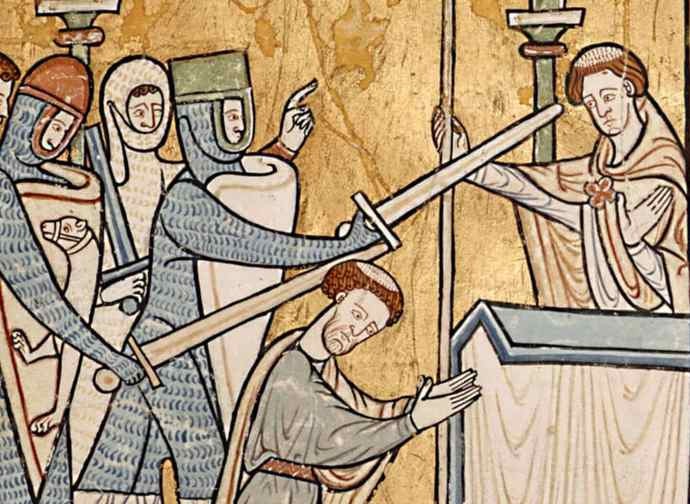Saint Thomas Becket
For most of his life he had been a man of the world. But when God called him to be a pastor of souls, St Thomas Becket (c. 1119-1170) fought to the point of martyrdom to defend the freedom of the Church, refusing to compromise with power.

For most of his life he had been a man of the world. But when God called him to be a pastor of souls, St Thomas Becket (c. 1119-1170) fought to the point of martyrdom to defend the freedom of the Church, refusing to compromise with power.
He was born in London to parents from Normandy. He studied the disciplines of the trivium and quadrivium. The Archbishop of Canterbury, Theobald of Bec, entrusted him with important missions to Rome, encouraged him to study canon law in Bologna and Auxerre, and a few years later, in 1154, appointed him Archdeacon of Canterbury. Aware of his collaborator’s skills, Theobald recommended him to Henry II for the vacant post of Lord Chancellor, a post that Thomas obtained in January 1155.
As chancellor he supported the king's reforms, which were aimed at re-establishing monarchical authority (weakened by Henry II's predecessor) by limiting the independence of landowners. As the king's right-hand man, Thomas attracted criticism from clerics and was accused of neglecting his duties as archdeacon. When Theobald died, it was natural for Henry II to propose Thomas as the new Archbishop of Canterbury, in the belief that he would continue to support his policies. But the future saint was already changing and warned the sovereign: “If God allowed me to be Archbishop of Canterbury, I would lose your majesty's goodwill and the affection you honour me with would turn to hatred, since several of your actions aimed at undermining the rights of the Church make me fear that one day you might ask something of me that I could not accept”. In the end, only the intervention of the apostolic nuncio convinced Thomas to become archbishop. He was consecrated on 3 June 1162.
His transformation was complete. Frugal meals, prayer, Bible reading, charity to the poor and the sick became part of his daily routine. Soon the clash he had predicted reared its ugly head. Henry II tried to influence other English bishops and proposed the approval of some royal rights that would limit the freedom of the Church, whose members were asked to swear to obey the “customs of the realm”. After months of wrangling, the result was the Clarendon Constitutions, by which the king extended his jurisdiction to the ecclesiastical sphere and demanded that the most important appointments in the Church be subject to his approval. Thomas, having reflected on the consequences of these rules, was the only one to offer firm resistance. In consequence he was tried for contempt of the king. He managed to escape to France, where he lived in exile for six years. While Henry was issuing edicts against him, Becket obtained the support of Pope Alexander III.
The papal delegates managed to reach an agreement with the king for Thomas's return from exile, but he already imagined what his fate would be: “I have returned to die among you”, he told the faithful. The dispute with the court was renewed within a few weeks. Although the exact words spoken by Henry II remain in doubt (“Will no one rid me of this turbulent priest?” is the most common version), four knights interpreted them as an invitation to physically eliminate the archbishop. They therefore caught up with him in the cathedral and butchered him by the sword (the assassination inspired T.S. Eliot's play Murder in the Cathedral) during Vespers on 29th December 1170: “For the name of Jesus and the protection of the Church, I am ready to embrace death”, were Thomas' last words. His tomb soon became one of the greatest places of pilgrimage in England and even Henry II went there, humbling himself with a public penance. The four knights were soon excommunicated by Alexander III. But they showed signs of repentance and went to the Pope, who ordered them to serve for 14 years in the Holy Land.
Patron of: secular clergy
